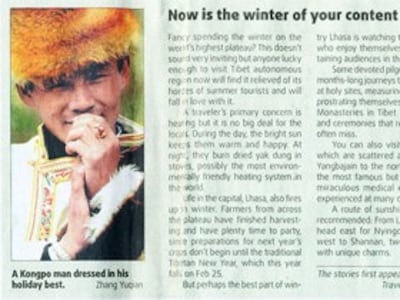HONG KONG—Tibetans inside China are largely skipping traditional Tibetan New Year, or Losar, festivities in response to China’s heavy-handed crackdown on protests against Chinese rule last year—but China’s official media are telling a different story.
“The authorities ordered all shops to be closed on the first day of Tibetan Losar,” one resident of Kardze [in Chinese, Ganzi] said in an interview. “But instead of complying with the order, most of the Tibetan shops were open early in the morning in Kardze town.”
“On a regular Losar, we see many Tibetans visit monasteries and involved in many celebratory activities. But today, the first day of Losar is very somber with no signs of celebrations,” the resident, who asked not to be named, said.
Residents of Kardze, part of what Tibetans know as Kham, have earned a reputation for speaking out against Chinese rule, experts say.
Another Kardze resident, who also spoke on condition of anonymity, said monasteries had rebuffed cash payments from the authorities to finance Losar celebrations.
“The Tibetan Buddhist monasteries in the Kardze area were offered several thousand yuan for the celebration of Tibetan Losar,” the second resident said.
“There are more than 30 large and small nunneries and monasteries in Kardze area. None of them accepted the government's offer. The monasteries said they were self-supporting and had no need of help for Losar celebrations.”
In Lhasa, meanwhile, capital of the Tibet Autonomous Region, residents described extremely tight security and the presence of soldiers, rather than worshipers, in Buddhist temples.
“Compared to last year this time, there are very few people to be seen in Lhasa. No one in and around Lhasa is celebrating Losar,” one witness said.

The Communist Party-run Lhasa Evening News reported in January that Lhasa officials would launch a so-called "strike hard" campaign against crime from mid-January through late March, coinciding with several politically sensitive anniversaries.
These include Losar; the 50th anniversary of the March 10, 1959, uprising against Chinese rule that prompted the Dalai Lama's flight to India; the first anniversary of March 10, 2008, protests; and the first observance of "Serfs Emancipation Day," a new holiday proclaimed by Chinese authorities, on March 28, 2009.
China’s official media are meanwhile playing up the two-week holiday with broadcasts and photos depicting a happy, peaceful region eager for integration with China and its dominant Han Chinese majority, which Tibetans say stands in stark contrast with reality.
The Dalai Lama, Tibet’s exiled spiritual leader, this week said he admired the determination of Tibetans to forgo New Year celebrations, though he stopped short of calling for a full-scale boycott.
“Last year in Tibet we witnessed hundreds of Tibetans losing their lives, and several thousands facing detention and torture, in response to the widespread display by Tibetans all over Tibet of their discontentment with the Chinese authorities’ policies,” the Dalai Lama said in his New Year message.
“Therefore, since they faced immense difficulties and sufferings, the occasion of this New Year is certainly not a period when we can have the usual celebrations and gaiety. I admire the determined move by Tibetans, inside and outside of Tibet, not to indulge in celebratory activities during this New Year.”
Official media
China’s official media, however, aim to tell a different story.
State-run television has broadcast footage of dancers in bright, traditional Tibetan garb performing as a crowd including monks applauded.
The official Xinhua news agency meanwhile depicted ordinary Tibetans celebrating as they always have—with performances, shopping, and feasts including “steamed stuffed buns.”
In an English-language dispatch, Xinhua notably cited a Tibetan woman named Tsering Drolma who “married a man from southwest China’s Chongqing Municipality, who is of the Han ethnic group, in the 1950s. She has a big family with four generations now.”
“The atmosphere welcoming the New Year is deepening,” a Chinese state television anchor said earlier this week, according to the Associated Press in Beijing. “Everyone is praising their happy lives.”
China regards the Dalai Lama as a separatist and accuses him of masterminding anti-China protests that followed the uprising last year and disrupted the international Olympic torch relay. The Dalai Lama denies the charges.
Original reporting in Tibetan by Norbu Damdul and Dolkar. Translated by Karma Dorjee. Tibetan service director: Jigme Ngapo. Written and produced in English by Sarah Jackson-Han.
